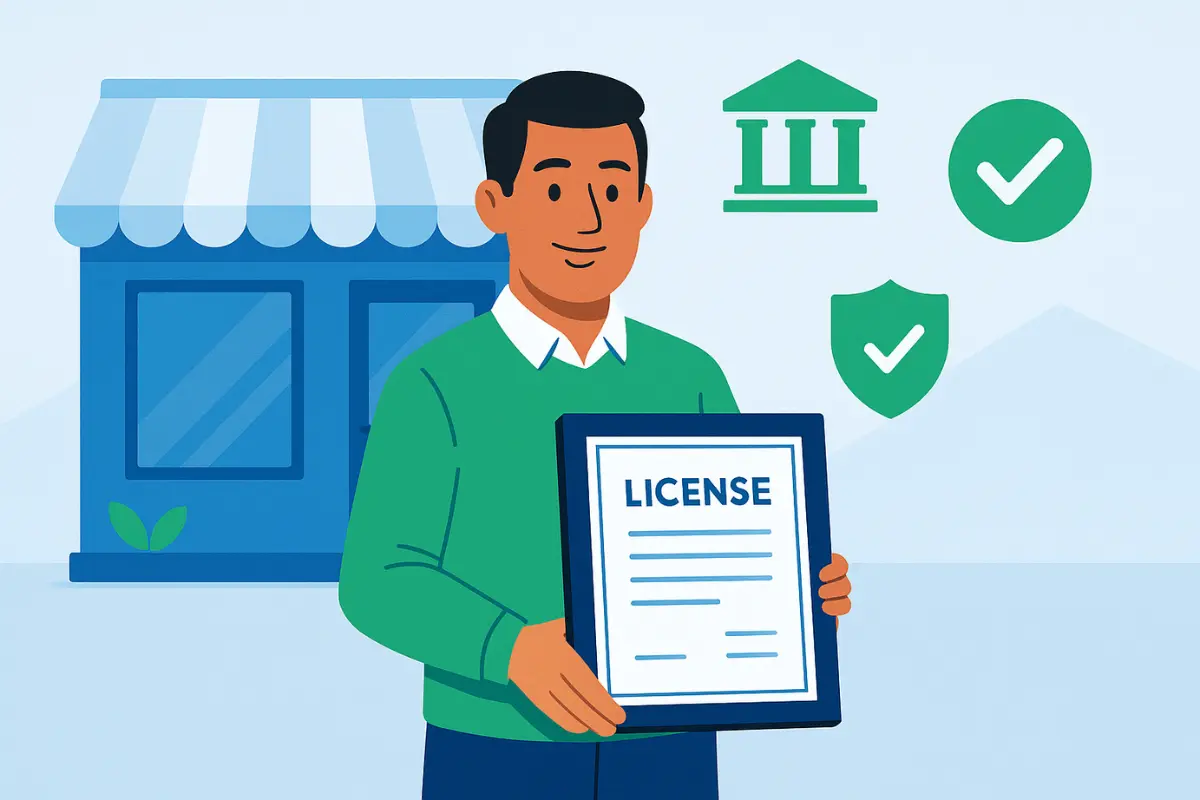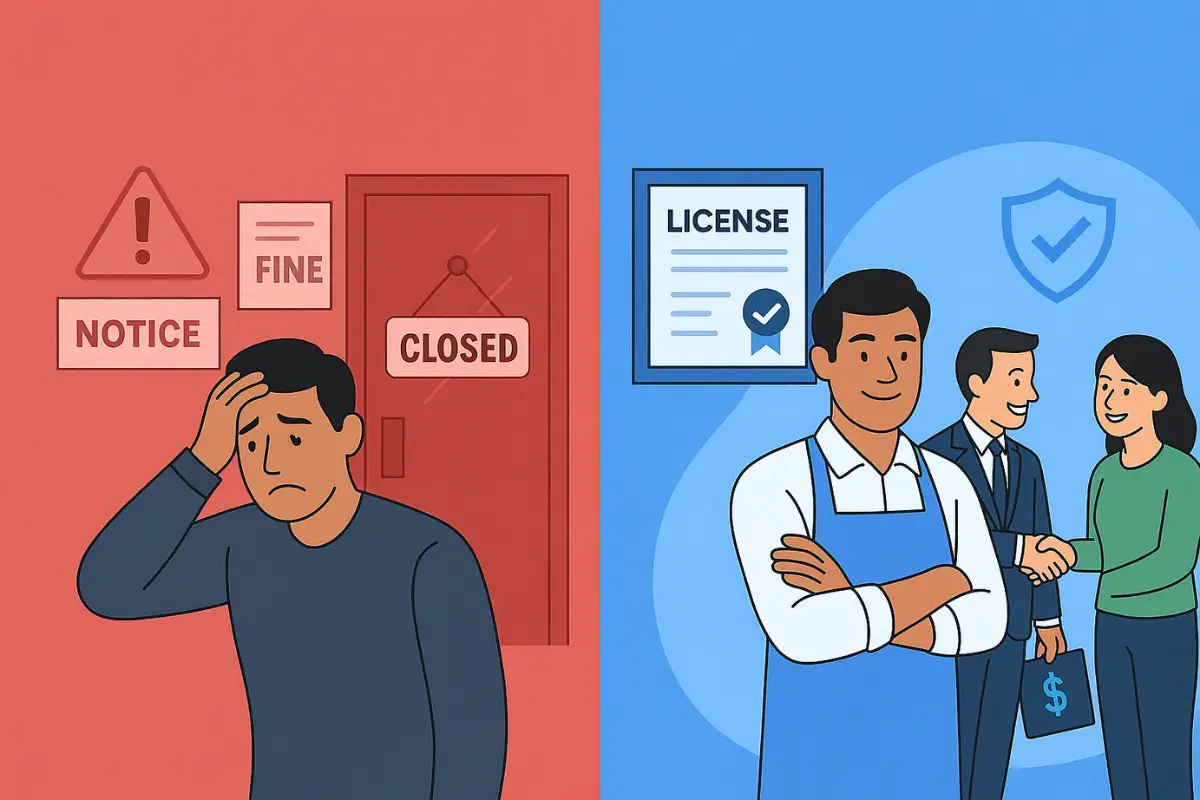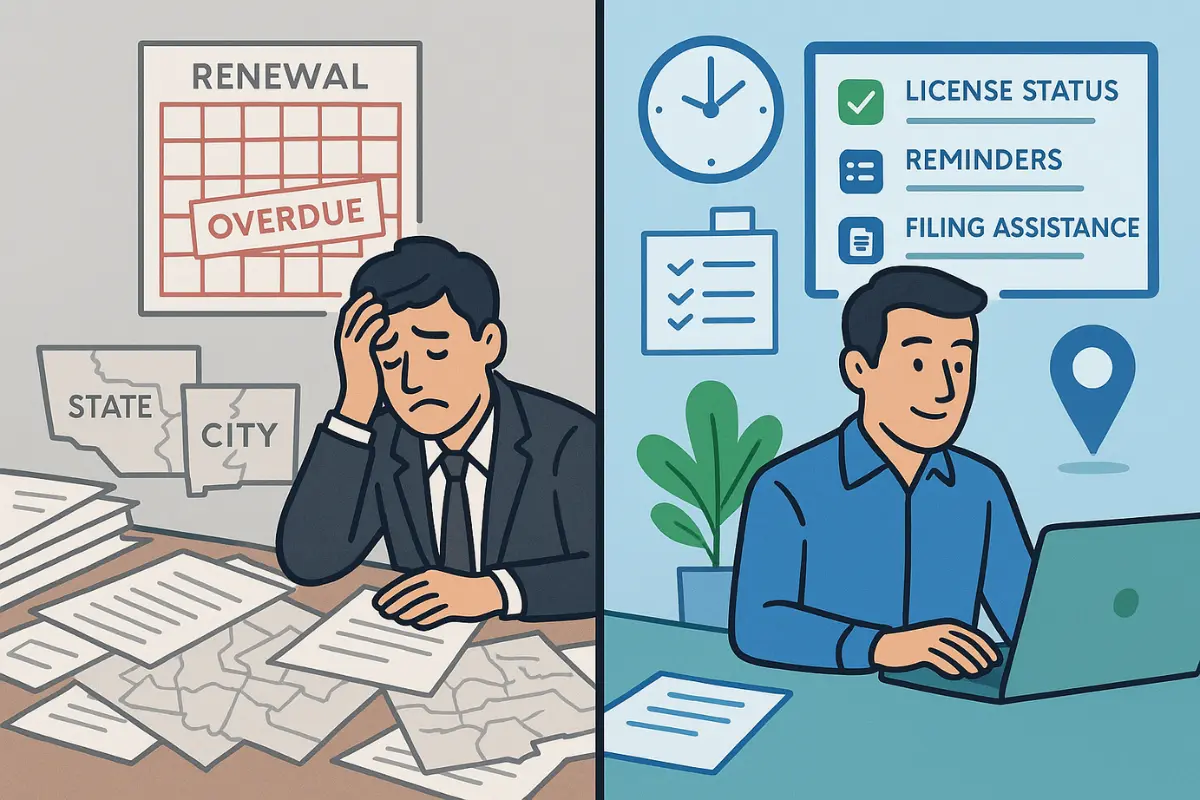Business Licensing: What It Is and When You Need It

What happens when a business operates without the proper government approvals? The consequences can include fines, forced interruptions while compliance is achieved, and a loss of credibility. While forming an LLC or corporation creates a legal entity, business licensing provides the official permission to conduct business activities. Understanding this distinction is a fundamental step for any new venture.
Navigating the various business license requirements is a complex but manageable process with the right approach. This guide explains what a business license is and when it's needed. Just as with entity formation and the appointment of a registered agent, securing the correct business licenses is a fundamental step in building a compliant and legitimate business.

Key Takeaways
-
Licensing vs. Formation: A business license authorizes operations, while forming an LLC or corporation establishes a legal entity.
-
Multi-Layered Requirements: Federal, state, and local governments may require different business licenses and permits.
-
Ongoing Compliance: Licenses typically require renewals to maintain an active status.
What Is a Business License?
A business license is an official authorization from a government agency that permits a company to operate within its jurisdiction. It is crucial to distinguish this from business formation.
-
Business Formation: Creating an LLC or corporation establishes the business's legal structure. Learn more about the differences between LLCs and Corporations in our guide.
-
Business Licensing: A license grants permission to engage in specific business activities at a particular location.
A business can be perfectly formed yet still face penalties for operating without a required local permit or state-level professional or business license.
Types of Business Licenses You May Need
Business licensing requirements often involve multiple levels of government. The types of business licenses and business permits a company needs depend on its industry, location, and activities.
Federal Business Licenses
Most small businesses do not require a federal license. However, federal business license requirements apply to industries regulated by federal agencies. These include:
-
Alcohol (ATF)
-
Aviation (FAA)
-
Firearms (ATF)
-
Transportation (DOT)
-
Broadcasting (FCC)
For example, a craft brewery must obtain a permit from the Alcohol and Tobacco Tax and Trade Bureau (TTB) before it can legally produce and sell beer.
State-Level Licenses and Permits
State business license requirements vary significantly. Common state-level approvals include:
-
Professional Licenses: For fields like law, medicine, and cosmetology.
-
Seller's Permits: To collect sales tax.
-
Contractor Licenses: Typically required for construction, electrical, plumbing, and other building trades to ensure compliance with safety and building codes.
Navigating these different requirements is a key challenge for businesses operating in multiple jurisdictions. For an example of what a state might typically require, check out the State of Maryland's business licensing page.
Local/City/County Licenses
This is the most common layer of business licensing. Most cities and counties require a general operating license. Additional local business permits can include:
-
Health Permits
-
Zoning and Land Use Permits
-
Signage Permits
-
Home Occupation Permits
Industry-Specific Licenses
Specific sectors, such as restaurants, healthcare, and finance, are subject to additional specialized licensing from agencies, including local health departments and regulatory bodies such as FINRA. A restaurant, for instance, will need health permits, a liquor license, and potentially a music license, in addition to its general business license.
Why Business Licensing Matters
Maintaining proper licensing is a core component of corporate compliance, and the risks of non-compliance can be significant.
-
Legal Penalties: Fines, penalties, and potential business closure.
-
Reputational Harm: A lack of proper licensing can erode trust with customers and partners.
-
Operational Barriers: It can prevent a business from opening bank accounts or securing loans.
Beyond avoiding penalties, proper licensing actively contributes to business success. It establishes credibility with customers, who often perceive a licensed business as more trustworthy and professional. This credibility also extends to financial institutions and potential partners, who view a fully compliant business as a lower-risk and more stable entity. Furthermore, many government contracts and grants are only available to businesses that can demonstrate they are in good standing with all relevant licensing authorities.

When Do You Need a Business License?
Specific business events typically trigger the need for a license. Because requirements vary significantly by state, city, and industry, identifying the proper licenses and permits can be complex.
Starting a New Business
Most businesses need at least one license, usually a local general business license, from the day they operate.
Expanding Into a New State or City
For registered business entities, physical expansion into a new jurisdiction often triggers additional business licensing requirements. Before any licenses can be obtained in that state, the business must register in that state —a process known as foreign qualification —which requires appointing a registered agent in that state.
Changing Business Activities
A significant change in a company's services or products can introduce new business licensing requirements.
Hiring Employees or Opening a Physical Location
Hiring staff or establishing a physical premises often triggers new permits related to employment, zoning, and health and safety. For example, hiring employees requires registering with state labor departments, while opening a physical storefront requires compliance with local zoning laws and building codes.
How to Get a Business License
Understanding how to apply for a business license is key, as the process is fragmented across various government levels, but generally follows these key steps.
-
Research: Identify every required federal, state, and local license and permit for your specific industry and location. This is the most complex step, often involving navigating different Business Licensing Division portals and understanding specific business licensing statutes.
-
Prepare: Gather necessary documents, which typically include your Employer Identification Number (EIN), entity formation documents, your official Business Name, and personal identification.
-
Apply: Submit completed applications, along with the required fees, to each appropriate agency. The relevant agency, such as the Department of Licensing and Consumer Protection, handles application processing.
-
Renew: Track and meet all renewal deadlines for each license. Maintaining compliance often involves regularly checking license statuses.
Common Challenges in Business Licensing
Business owners often face hurdles when managing their business licensing:
-
Jurisdictional Complexity: Navigating the different rules for each city, county, and state. A food truck, for instance, may need different permits for every city it operates in.
-
Time Consumption: The research and application process can involve contacting city clerks, navigating state Secretary of State websites, and deciphering complex requirements, all of which can pull founders away from revenue-generating work.
-
Deadline Management: Juggling multiple renewal dates across different agencies is a common point of failure. A single missed deadline can lead to late fees or a lapse in authorization.
A single oversight during this process can result in applications being rejected, causing significant delays in business operations.

Conclusion: Keep Your Business Compliant From Day One
Business licensing is not just a formality; it's a fundamental requirement for operations, protecting your company's credibility, and supporting sustainable growth. Understanding what you need and when you need it is critical to navigating the broader compliance landscape successfully.
While securing the correct licenses is a task business owners manage directly, the foundational steps of forming your entity and keeping it in good standing are crucial. InCorp provides expert support for these core services, including:
-
Entity formation (LLC, Corporation)
-
Foreign Qualification
-
Registered Agent Services
-
DBA (Doing Business As) Filings
Explore InCorp's Business Services.
FAQs
Do all businesses need a license to operate?
The vast majority of businesses require at least one license or permit to operate legally. While a simple, home-based freelance writer might only need a local business license, a restaurant will need a complex web of health, safety, and signage permits. Your industry determines the specific requirements, the business activities you conduct, and your physical location (state, county, and city).
How much does a business license cost?
Costs vary dramatically based on jurisdiction and industry risk. A general business license in a small town might cost around $50, while the same license in a major metropolitan area could be $400 or more. High-risk or specialized industries like childcare, contracting, or alcohol sales often require additional permits, which carry much higher fees — sometimes reaching thousands of dollars — due to increased regulatory oversight and insurance requirements.
Is a business license the same as an LLC or incorporation?
No, they serve fundamentally different purposes. Forming an LLC or corporation (incorporation) creates your business's legal structure and separate identity, which can help shield your personal assets from business debts and obligations. A business license, on the other hand, is a permit from a government agency that grants your legally-formed entity the specific permission to conduct regulated activities within a particular jurisdiction. Most businesses need both: the entity for its structure and liability protection, and the license for its legal authority to operate.
Do online businesses need a business license?
Yes, the "online" nature of a business does not exempt it from licensing. Licensing is typically based on business activity and location, not sales channel. An online store generally needs a sales tax permit from its home state (and possibly others, based on nexus rules). If the business is run from a home, a local home occupation permit may be required. Furthermore, if the company offers licensed services like consulting or coaching, it may need state-level professional licenses.
Can I operate my business without a license?
Operating without a required license is a significant legal and financial risk. Consequences escalate from fines and penalties for initial non-compliance to accruing back taxes and, ultimately, a court-ordered cease-and-desist that can force the business to shut down. Proactive compliance from the start is the only reliable way to build a legitimate and sustainable business.
Share This Article:
Stay in the know!
Join our newsletter for special offers.